Do you know what is most important for a successful business? Yes, any business coach will be happy to tell you: entrepreneurial talent, some unique combination of hard and soft skills, the ability to not give in to difficulties, delegate authority and negotiate… You can collect a whole list of points, but one, perhaps the most important, will not be there. Completely undeservedly, to be honest.
A sense of humor, or to be more precise, a sense of irony, is what prevents a business owner from always staying on the same vibe with the staff, from turning into a huge bronze monument to their own success. Something that allows you to ironically write a post in the Malicious Compliance community on Reddit about your own fail – as the user u/Asoyedit recently did. Just believe us, it’s really worth it!
The author of the post is a business owner in Italy and their staff makes goods on customers’ orders

Image credits: Alexander Isreb (not the actual image)
The boss was fed up with staff’s habit of changing the specs of the job without asking the customers, so they had to face refunds quite often
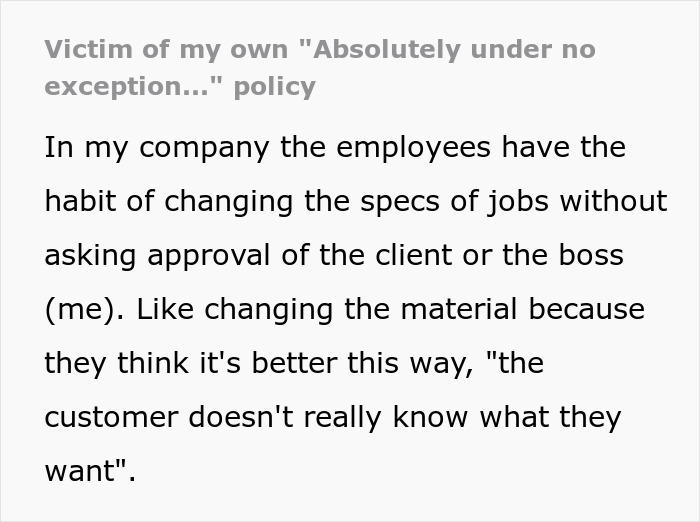

Image credits: u/Asoyedit
To wean the employees from this habit, the owner issued an instruction forbidding changing the order specs with no exception

Image credits: Linkedin Sales Solutions (not the actual image)

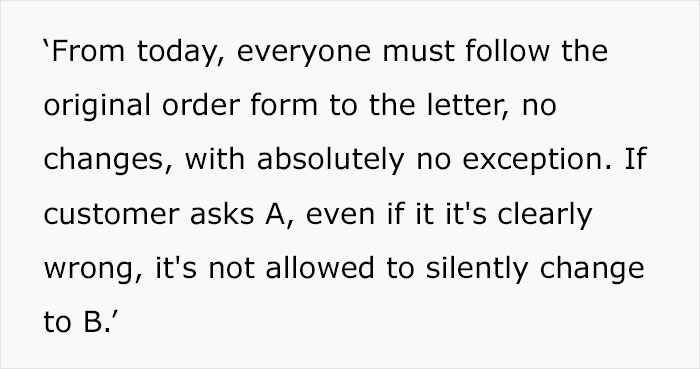
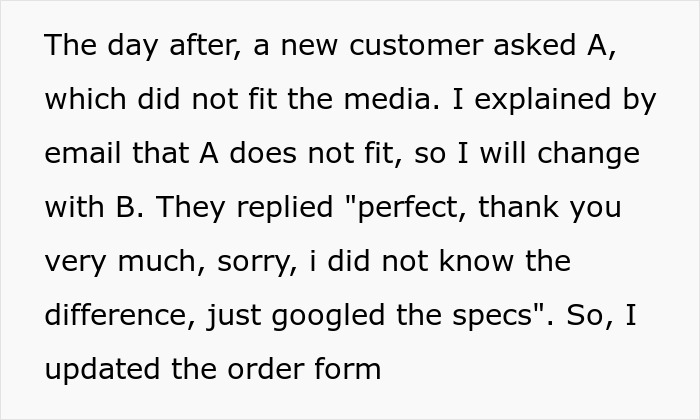
Image credits: u/Asoyedit
This backfired on the author themselves when they convinced another customer to make some changes to their original order

Image credits: ThisIsEngineering (not the actual image)
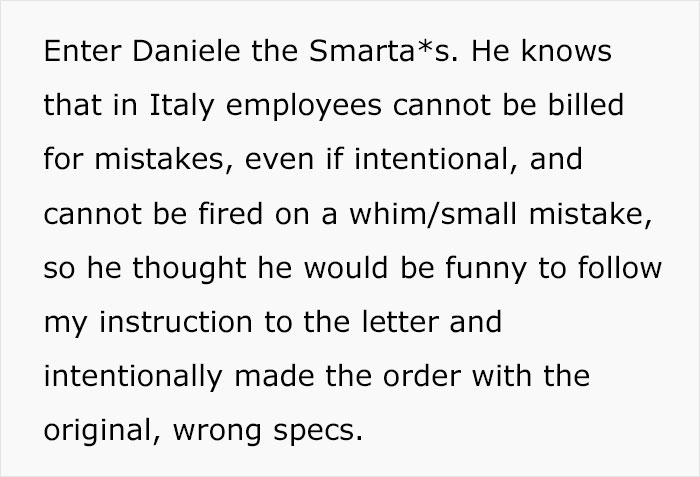
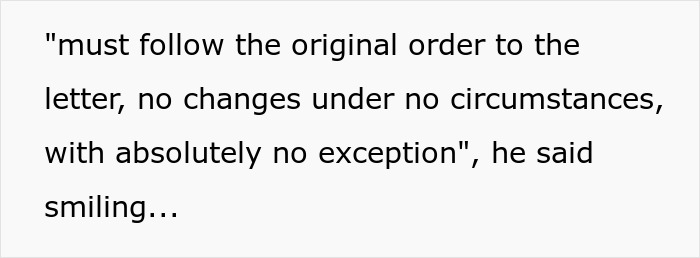

Image credits: u/Asoyedit
One of the employees just obeyed the newest instruction literally to the letter, completing the order with the initial specs
So, the Original Poster (OP) lives in Italy and runs their own business, making some products for customers. As the author of the post says, their employees have made a habit of changing the specs of jobs without asking for approval from the client or the boss. For example, it may be about replacing the material – simply because they believe that they understand their business better than the client.
Of course, the business owner is dissatisfied with this state of affairs – at least because they often have to deal with partial or full refunds. And, of course, customers are far from always delighted with such “care” on the employees’ part, and leave bad reviews on Google – they say they ordered one thing, but received something completely different.
And since the OP was tired of all this, they issued an instruction to the whole staff forbidding changing the specs, with absolutely no exception. In other words, even if the customer was completely wrong, it was necessary to follow the terms of the order to the letter. Well, it sounds quite logical – however, literally on the next order, this owner’s demand hugely backfired on them.
One of the employees, named Daniele, was well aware that the labor law in Italy prohibits billing employees for mistakes, even if intentional, and even firing them on a whim or mistake. So the trickster worker decided that this new instruction was a great opportunity to play a trick on the boss…
It all happened when another client ordered, let’s call it “A”, which did not fit the media. The original poster reached out to the client and explained that it would be better if the specs were changed to “B”. The client – a rare case – agreed, and even sincerely thanked the author for such foresight. What came to the OP’s surprise was when, a few days later, they ended up with another partial refund – simply because Daniele completed the order in strict accordance with the original specs, without the slightest change!

Image credits: Chevanon Photography (not the actual image)
“Of course, order changes are unexpected things for the client, even if the employee really knows better,” says Nick Pruchkovsky, the QA engineer at DIGIS company, with whom Bored Panda got in touch for a comment on this situation. “But in any case, such changes need to be documented and agreed upon. Simply because not a single one, even the most talented master of their craft, not a single project manager, will get into the customer’s head and get what they really expected from this order.”
“So the instruction from the business owner from this point of view seems completely correct and appropriate. Although, any categoricalness in writing instructions always has two sides as well, and the boss here fell victim to their own integrity. Although the very fact that the owner found the strength to laugh at themselves – above all, above themselves and not above the employee – really speaks in their favor. A self-deprecating boss almost always means a good boss,” Nick thoughtfully presumes.
Most people in the comments, however, noted that one should distinguish between malicious compliance and malicious defiance on the part of the employee. And since the original poster discussed changes to the terms of the order with the client and made changes as well, the worker was just showing disobedience. On the other hand, perhaps the whole point is precisely in the specifics of Italian legislation, which stipulates such behavior of staff: “I just wish there was a way to downvote Italian labor laws…” one of the commenters wrote.
Be it malicious compliance or defiance, you could perhaps enjoy these posts of ours as well: about an employee getting called out for just helping colleagues unload their car, or about an worker submitting a summer time off request 7.5 months in advance yet getting flatly rejected by the boss on the only ground that they were a part-timer. And, of course, we’re looking forward to your comments on this tale as well, and your own stories, especially if you’ve ever had something similar at your work.
People in the comments noted it was not exactly malicious compliance but more of an act of malicious defiance on the worker’s side




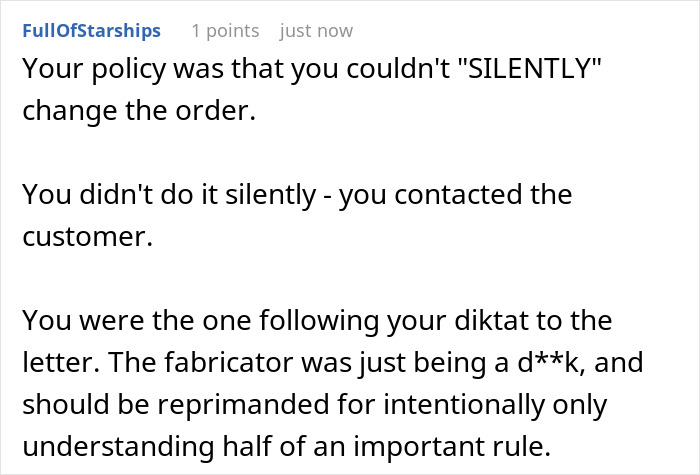




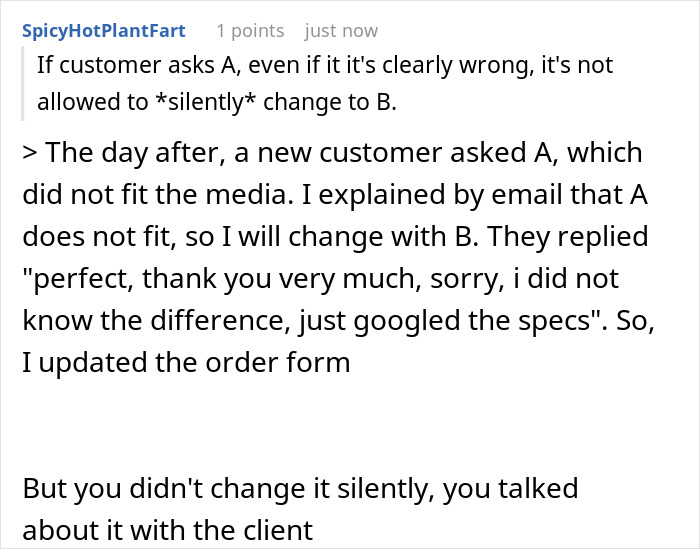
The post Supervisor Discovers He Has Become The Victim Of His Own Rule That Forbade Exceptions After Employee Maliciously Complies first appeared on Bored Panda.

















